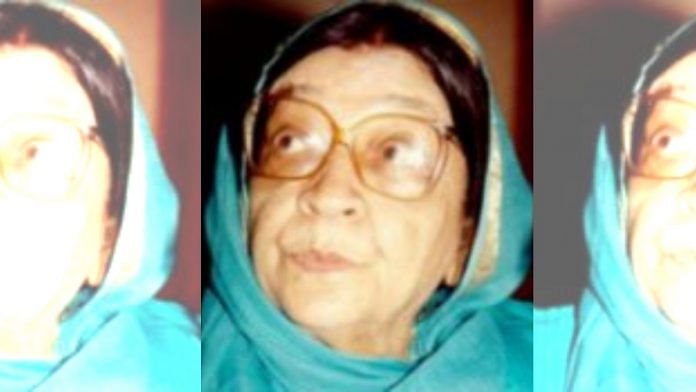New Delhi: Silence was never an option for Sahitya Akademi awardee Krishna Sobti. She wrote as she lived—defiantly and honestly. Her work is a reminder of “the power of a writer’s words,” said poet Ashok Vajpeyi at an event to commemorate her 100th birth anniversary on 19 February. Writers, professors, students, and poets gathered at New Delhi’s India International Centre for a two-day seminar to explore Sobti’s work.
Speakers from all over India, including playwright Nand Kishore Acharya, author, playwright and essayist Mridula Garg, and historian Biba Sobti were in consensus: Sobti’s stories of an India finding its voice as a new democracy continue to hold currency today.
Krishna Sobti didn’t just write fictional tales, she captured moments in time through strong female characters who defied tradition and society’s strictures. Such narratives would be considered outliers even in 2024.
The event ‘Shabdon Ke Alok Mein’ (into the light of words) was divided into sessions, named after the titles of her novels. In the pathbreaking novel Mitro Marjani, published in 1967, she spoke about a woman’s body, her desires, and her sexuality. Set in rural Punjab, Sobti’s protagonist was a married woman — which was all the more ‘shocking’ given the themes.
In Surajmukhi Andhere Ke (Sunflowers of Darkness), a 2008 publication, she delved into the psyche of a woman who had been sexually assaulted, and in 1991’s Aai Larki, she explored the relationship between an elderly woman and her daughter.
“A couple of years before her death, Sobti delivered a speech about her life and prose. She was sitting in a wheelchair, and when she finished speaking, the people present there started cheering and clapping for her. That day I felt the power of a writer’s words better,” recalled Vajpeyi.

Also read: Ganga, Dharma, Buddha—Ukrainian poems take from Indian tales. Both nations share lot in common
Ahead of time
Critics often say that Sobti’s female characters were ahead of their time. They explored their sexuality, desire, identity, and role in relationships. But that’s a fallacy. They were real, current—just underreported.
Yogesh Pratap Shekhar, who teaches Hindi at Kendriya Vidyalaya in Bihar, spoke about how Sobti never compromised on her work. She never altered her writings due to criticism, he said, citing the example of Surajmukhi Andhere Ke. The novel follows the story of a girl who was sexually abused as a child and how it changed her.
“However, Kamleshwar, the former editor of Sarika magazine, had proposed to make it ‘Surajmukhi’, which Sobti rejected,” said Shekhar. Sobti wanted the contradiction. In the title given by Sobti, ‘Surajmukhi’ (sunflower), which turns towards sunlight, is shown with darkness, serving as a metaphor for what happened to the protagonist.
Sobti’s books have been translated into multiple Indian and foreign languages, including Swedish, Russian, and English. Her 1979 novel ‘Zindaginama’, which won the Sahitya Akademi award the following year, was translated into English in 2017.
While professors, poets, and writers of the Hindi language discussed Sobti’s journey, her writing skills, choice of words, language, and vision, Vajpeyi mentioned the type of “shiny” paper Sobti used for her drafts. She chose the paper as carefully as her words.
In a 2017 interview with The Indian Express, Sobti described writing as a humbling experience. She was 92 at the time.
“All I have are a few images, ideas, and an eagerness to witness them on paper,” she said.
(Edited by Ratan Priya)



